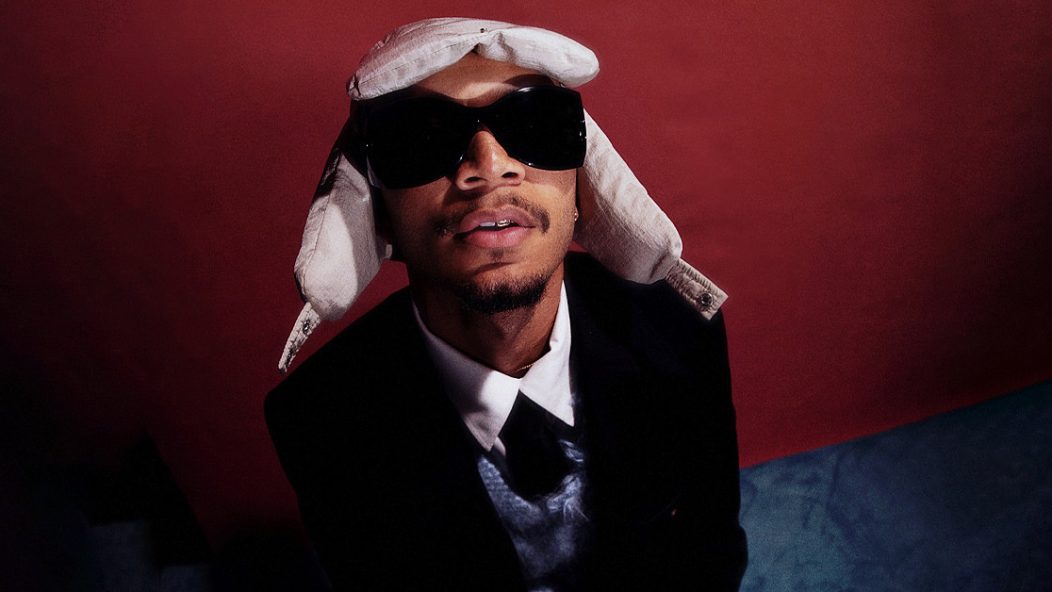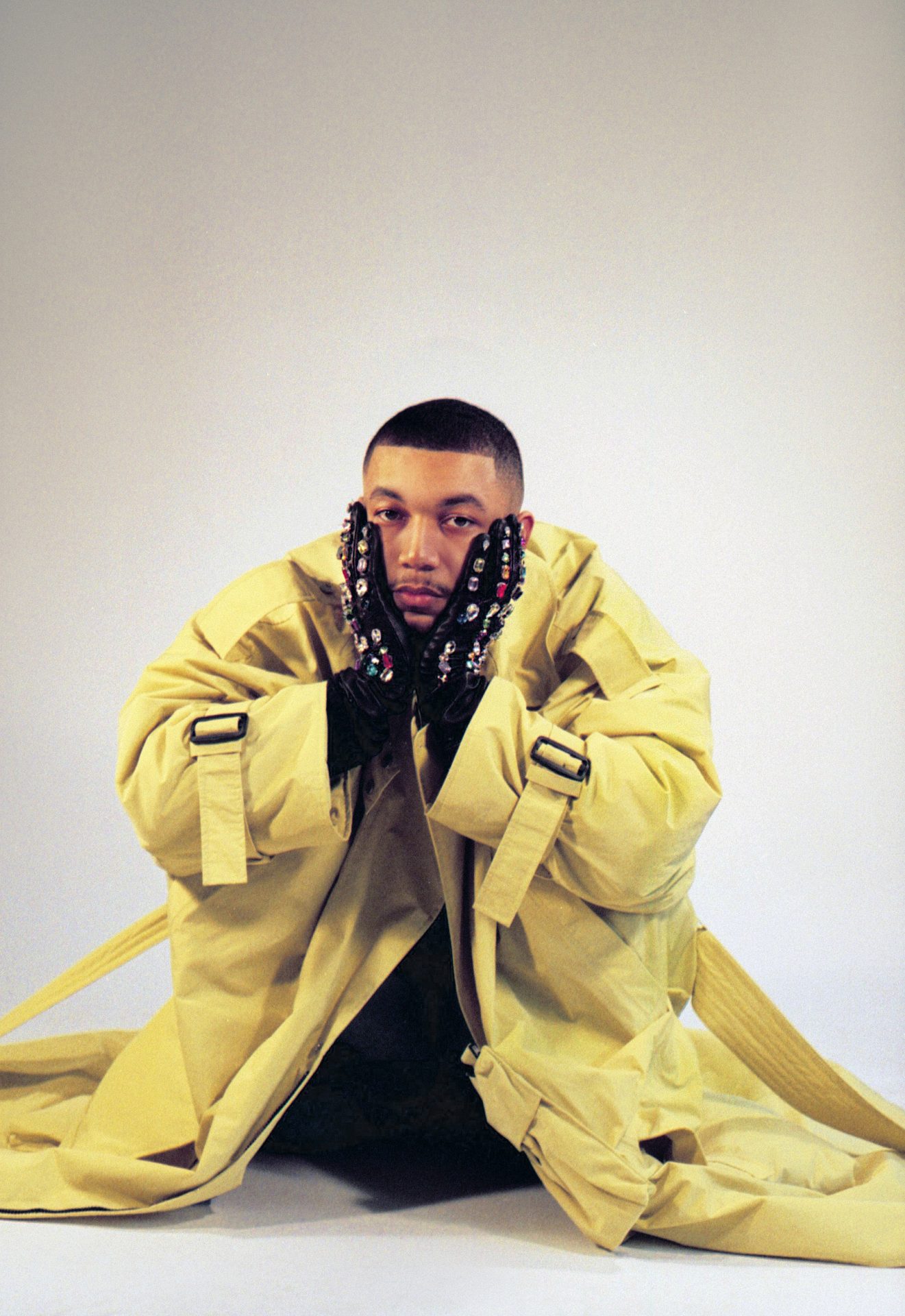
On GLOW, alternative R&B artist Wesley Joseph is bursting with colors
In a conversation over Zoom, London-based alt-R&B/hip-hop artist Wesley Joseph references a film called Velvet Sunshine that he says he watched when he was completing his new album GLOW (out now via Secretly Canadian). It’s a film he’d watch with the sound entirely off. If you were to look Velvet Sunshine up, though, you would find no such film. In reality, it seems to be the name he concocted for whatever the movie it really is, which he played on repeat for visual inspiration.
It makes sense Joseph might do this, as he has a track record for thinking in colors. His first full body of work, released in 2021, was titled Ultramarine, which he explained as one of the most valuable pigmentations on the planet, funnily enough, during his interview with the music discovery platform COLORS. Listening to that project, you get an overwhelming sense of deep blue emotion within the wave-like synths and indigo vocal tones. But in his new body of work, you hear that aqua turn into various shades of purple and red, including velvet, that eventually shimmer into a beam of sunlight.
Read more: Curtis Waters is the indie triple-threat to watch this year
The 26-year-old Walsall, England-born artist has created his own version of the label “triple threat.” As a vocalist, producer, and university-trained filmmaker, he creates through color across various mediums organically. When you watch any one of Joseph’s self-directed music videos, it’s easy to see how he carries over the color scheme he’s playing with in the studio into his visual creations. His ability to take a lyric like, “All black in the villa back with the breeze/Headed for pinnacles pressing on me/Nothing is visible that I can see/Make an impression it come in 4D,” on GLOW‘s lead single “COLD SUMMER,” and translate it into a multi-colored optic collage, is what has made Joseph an artist to watch.
When crafting the second verse of “COLD SUMMER,” he describes composing “demon mode shit, a return, but not a bright return, super villain theme music written with that fire in your belly,” and then swiftly transitions to defining this process as, “just painting the emotional palette for it all.” Being the first song he wrote after Ultramarine, when you look at the absurdist visual aligned with the track, you see assortments of blue, black, and green in the room lighting or colors of the walls. Yet weaved in harmony with those same colors are red rising fog and the decadent purple of a three-piece pinstripe suit.
“COLD SUMMER” began a shift in Joseph’s music, starting with the letting go of his Ultramarine alter ego, Frederick. He says he created this alias initially to give himself “poetic license to do things that are a bit extra and a bit out there,” which translated into distorted vocal musings. Joseph’s debut was all about creating an artistic world through characters he interacted with to sort through his emotional state. Thus, Frederick appears in the “COLD SUMMER” video as a final homage to his influence. Now, his sonic world on GLOW is all about instinctual, reflective vocal and instrumental meditations on his current and lasting reality. “Every single song off the new record is just me, completely,” Joseph explains. “With GLOW, it was more about how I was feeling in the moment. It was more about looking inwards this time.”

[Photo by Lewis Vorn]
The title track of the project begins with a question delivered in Imogen Heap-esque acapella layers. Joseph eerily sings, “How do you see me when you’re glowing so bright?” He describes this moment as one of pure impulse, using Auto-Tune and vocoder over subtle synths played by his co-producer Harvey Dweller. He sang the first thoughts in his mind during a time in which he was ruminating on a dark mental state. After he finished the freestyle, he figured he’d go back and change the lyrics, but with further inquiry, he realized the purpose of his natural flow. “That lyric is why the whole project is called GLOW,” Joseph says. “There’s so many perspectives and beautiful things in the contrast of something glowing around the darkness — whether it be you being in the darkness and seeing glow as a source of hope, the contrast of warmth and darkness in life, or even the journey and duality of both.”
This epiphany led him through more darkness, until emerging on the other side to what would be his eventual closing track “Light Light.” “I made that towards the end of the dark period where I had this beautiful dream,” Joseph reveals, describing a dream in which he was visited by a woman caretaker from his youth who passed away. “I had this big weight lifted off me. All my anxieties went away for a whole month and I gained a lot of perspective.” As Joseph sings, “Let me guide your hands to the pain inside,” on “Light Light,” catapulting into bubbly falsetto croons above a contrast of hard drums and suspended synths, the project’s closing message becomes clear: Sometimes we need a visiting spirit to help us find the glow within ourselves.
Naturalizing this track spurred the creation of three others that land in the first half of GLOW, including his second single, “Monsoon,” which has the most clear earworm in the chorus on the record. The track explores his reality from two perspectives: the first verse from the purview of his 17-year-old self, trying to escape the town he was raised in, and the second verse from the viewpoint of his current self. “When I was at home, it was very constricting, because it was like your whole existence is living in a garden with high fences,” Joseph says, of what he’s exploring in the beginning of the song. “It was constricting, and that bred being depressed and having anxiety and not being happy — essentially wanting to do better, but then not seeing a way to do better.”
This would cause Joseph to daydream about an unforeseeable future to cope with his limited existence. “People used to call me slow because I used to always be daydreaming about some ambition,” he says. “But in hindsight, that’s like all I do for my job. I just make things and daydream about them.” Thus, resulting in the lyric “I feel purpose and soul, feel it burn inside me,” atop the second verse of “Monsoon.”
This reversal of his youthful resentment also contributed to a new outlook on the small market town of Joseph’s youth. “A lot of what surrounded me back home wasn’t necessarily positive or inspiring, but after leaving, looking back, it’s the reason why I am who I am,” he deduces. “It’s the reason why I’m self-sufficient. It’s the reason why I will never have a big head because I’m from a place where you can’t be like that or you’ll get checked. So, I’m appreciative in hindsight. I wasn’t aware of the other side of the fence, I just desperately wanted to be outside of where I was contained.”
GLOW is a quintessential journey from dark to light, from rejection to appreciation, and from a lack thereof to abundance. In turn, in making the record, Joseph himself journeyed from the past to the future where he wants his music to live on. He claims making music for the present “only feels good until it’s over” and candidly wants to make music that’s both “futureproof” and “can be of service to people.”
That said, what makes Joseph feel most present and “in Heaven” is being in the rhythm of making a song in the studio that feels like it’s “opening up something beyond” him. He and his collaborators refer to this process as “riding the dragon.” If you had to guess the color of the dragon on the best moments of GLOW, velvet seems plausible — with fire projecting from its mouth like sunshine on a scorching hot day.










